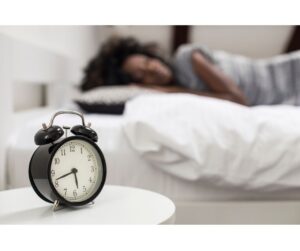How to sleep better
Sleep is one of the most underrated tools to help you stay healthy. Having a poor night’s sleep can cause low energy which can lead to an increase in the stress hormone cortisol, which can then raise your blood sugar levels. We will then crave high-fat and sugar foods to help to give us more energy to get through the day.
Here are our tips to help you get a better night’s sleep:
Set a bedtime routine
Our bodies like routine, so keeping the same time for when you go to bed and wake is really beneficial for a good night’s sleep.
Try to wake up at the same time each day, even on the weekends, and schedule in some wind-down time at the same time each evening which can help the body know it is time to relax.
Reduce screen time
Cutting down on screen time can be really beneficial as light from the devices can activate a part of the eye that thinks it is morning and the blue light can suppress the sleep hormone melatonin. There are now filters you can put on your phone now to dim the blue light and you can also get blue light-blocking glasses.
Avoid alcohol, caffeine and smoking
All of these are stimulants in the brain and can activate the stress hormone cortisol at unnatural parts of the day. This can disrupt your natural sleep cycle which can prevent you from entering a deep sleep.
Try Meditation
Meditation has been shown to help raise melatonin levels and can help take your mind away from any worries that you may have throughout the night.
Set up the proper sleep environment
Over the past few years, working at home has become a norm for many, but try to avoid making the bedroom a work space, keep it solely for the purpose of sleeping and relaxing. Make sure you clear the clutter, it is a comfy room and it is a nice cool temperature for you to sleep in.
If you feel that your sleep is a problem and it may be affecting your type 2 diabetes management, you can sign up to one of our memberships to use our MySugarWatch needle-free continuous glucose monitoring device, and get support from our diabetes specialist coaches.
References
Better Health (2022) How to fall asleep faster and sleep better. Available at: https://www.nhs.uk/every- mind-matters/coronavirus/how-to-fall-asleep-faster-and-sleep-better/ (Accessed on 4 January 2023).
Mind (2020) How to cope with sleep problems. Available at https://www.mind.org.uk/information- support/types-of-mental-health-problems/sleep-problems/tips-to-improve-your-sleep/ (Accessed 4 January
2023).
